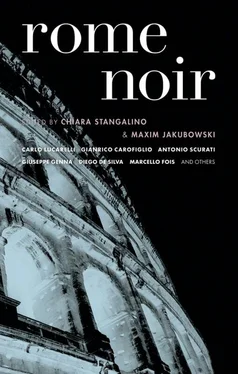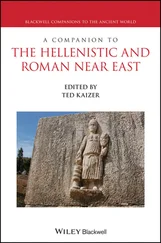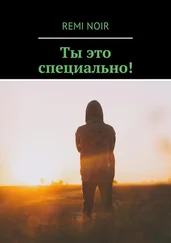Джанрико Карофильо - Rome Noir
Здесь есть возможность читать онлайн «Джанрико Карофильо - Rome Noir» весь текст электронной книги совершенно бесплатно (целиком полную версию без сокращений). В некоторых случаях можно слушать аудио, скачать через торрент в формате fb2 и присутствует краткое содержание. Город: New York, Год выпуска: 2009, ISBN: 2009, Издательство: Akashic Books, Жанр: Детектив, на английском языке. Описание произведения, (предисловие) а так же отзывы посетителей доступны на портале библиотеки ЛибКат.
- Название:Rome Noir
- Автор:
- Издательство:Akashic Books
- Жанр:
- Год:2009
- Город:New York
- ISBN:978-1-933354-64-4
- Рейтинг книги:3 / 5. Голосов: 1
-
Избранное:Добавить в избранное
- Отзывы:
-
Ваша оценка:
- 60
- 1
- 2
- 3
- 4
- 5
Rome Noir: краткое содержание, описание и аннотация
Предлагаем к чтению аннотацию, описание, краткое содержание или предисловие (зависит от того, что написал сам автор книги «Rome Noir»). Если вы не нашли необходимую информацию о книге — напишите в комментариях, мы постараемся отыскать её.
Rome Noir — читать онлайн бесплатно полную книгу (весь текст) целиком
Ниже представлен текст книги, разбитый по страницам. Система сохранения места последней прочитанной страницы, позволяет с удобством читать онлайн бесплатно книгу «Rome Noir», без необходимости каждый раз заново искать на чём Вы остановились. Поставьте закладку, и сможете в любой момент перейти на страницу, на которой закончили чтение.
Интервал:
Закладка:
I remember the beginning of that famous summer very well. I decided to stay in Rome. I liked the deserted city, liked not having to wait in line at the post office or the supermarket. During the day I worked and at night I went to see the films that were shown in Piazza Vittorio. Coming home, I smoked a joint and fuck the rest. I wasn’t rolling in dough but I had a peaceful life, without bumps.
It began to get hot. But really hot. You, too, will remember. Old people died. The newspapers and television said that such a heat wave had never been recorded before. Every day they interviewed some expert who went on and on about climate change, pollution, melting glaciers, and emissions standards. We all nodded our heads yes, but we weren’t really listening. It was something in the future. In less than fifty years there will no longer be annual snowfall even on the highest mountains, said the experts. And what did we care about what would happen in fifty years? The only thing we were interested in was when the heat wave would pass. We waited for the storms of late August.
August passed. Then September passed, and October. Of the storms, no trace. The heat increased. When Christmas came, the temperature hovered around a hundred degrees. Not knowing what to do, people went to the beach. They thought that after New Year’s winter would finally come. Instead, the fires began and at that point people began to get seriously pissed off. They demanded answers, wanted to hear that sooner or later everything would go back to the way it was before. The experts said that such a phenomenon had never been recorded. But this was not an answer or reassurance.
In the end, people began moving to the north. More or less in the same period the first waves of Chinese arrived. People sold their houses and the Chinese bought them for cash. After a year it seemed like Shanghai in the days of opium smoking and bordellos. It was fascinating, from a certain point of view. So although I no longer had a job, I figured I’d stay.
My boss had decided to shut down operations. Business was getting worse and worse, and without ceremony he gave me my walking papers. In retrospect, it seems to me he behaved rather badly, but right then I didn’t care. The job had always been shitty, I wasn’t at all sorry to lose it. I took the severance pay with the firm intention of scraping by. It wasn’t a huge sum, but, thanks to the Great Summer, prices had tumbled. With a little economizing I could afford not to work for several years. If I moved to the north, that money would be gone in a few months and I’d have to start seriously slogging. I had no desire to do that.
Every so often my mother called, worried. She said that sooner or later the money would run out. “And then? What do you intend to do then?” she asked. A good question. Only I had no intentions. I told her I would think about it at the proper moment. According to my mother, I should join her in Lambrate, outside Milan. It seems there is a lot of work in that area. I was in Lambrate once. You have no idea what a god-awful place we’re talking about. Total desolation. “I’ll think about it, Mama,” I said. Then I hung up and rolled a joint or drained a couple of cans of beer. Not infrequently I did both together.
At the time I was not yet living on Via Veneto. I had taken a studio not far from Piazza Vittorio, in the middle of the historic Chinatown. I led a peaceful, orderly life. I got up, ate breakfast, and leafed distractedly through a book, waiting for the temperature to go down. Around midnight I went out. I wandered through the neighborhood, ending up inevitably at the market, and, with no real goal, struggled to make my way among shouting vendors and old Chinese women examining the greens displayed in the stalls. Often I stopped in front of a shop selling tropical fish and killed time watching those strange creatures circling the aquariums. I ate around 2 in the morning, usually noodle soup. Soon afterward the Forbidden City opened.
It’s there that my life changed forever, there that I met Yichang. The Forbidden City was a go-go bar. There had never been places like that in Rome before the Great Summer — I think because of the Vatican. Usually I stayed almost until closing time. I drank beer, watched the girls dance, waited for dawn. It was my favorite time of the night. Maybe because in my life I didn’t do much, while there it seemed to me that a lot of interesting things happened. I wouldn’t be able to say what things, exactly. Basically it was just a place where men went for whores.
One night Yichang sat down next to me. I had now been going to the Forbidden City regularly for several months and had the impression I hadn’t seen him before. I was wrong, because he knew me. In the sense that he had noticed me.
He asked if I liked the place and I said yes.
“I thought so,” he said.
I didn’t know what to say.
“Where did you come from?”
“Nowhere, I’m from Rome.”
He widened his eyes; I might have said I was a Martian.
“A Roman in Rome — a real rarity. May I buy you a drink?”
I shrugged. I had no desire to talk. I was used to minding my own business. I looked at the girls and my head emptied out in a pleasant way. This man was inserting himself between me and the best moment of my night. But I couldn’t refuse. He was Chinese, we were in a place run by Chinese and frequented by Chinese. Few Italians came to the Forbidden City, and those few were almost all northerners on vacation and often they were down-and-out.
“May I ask why you’ve stayed in Rome?”
I was about to say, No reason , but I stopped myself. The Chinese are busier than ants, they don’t trust idlers. “Business.”
“Ah,” he said, and shook his head as if to consider the answer. After a pause he asked, “And what do you do?”
Another good question. The world was full of people who were concerned with what I did. I said that I was a journalist, the first thing that crossed my mind.
“Really? And who do you write for?”
“A little here, a little there. Reports from the Roman front.” The truth is that I hadn’t the faintest idea how a newspaper works. I’ve never written a line in my life, not even a shopping list.
“I suppose you do well.”
“Not as well as you think. Let’s say I get by.”
He smiled, touched my bottle of beer with his. Then he changed the subject, luckily. I couldn’t go on shooting off my mouth about something I knew nothing about.
“Do you come here often?”
I took a swallow and nodded my head yes.
“You like this place, eh?”
“Yes, it’s not bad.”
He was silent for a while, looking at the girls rubbing their bodies against the steel poles.
I was under the illusion that the conversation had ended there, when he said, “And why do you like it?”
What the hell sort of question was that?
“You know why I’m asking? I’m asking because I’ve seen that you come here every night. You sit down, you have a couple of beers, you stay till closing, but you never ask a girl to your table. And I wonder why.”
“I don’t like to pay for sex.” It was true, but only in part. The real reason is that I couldn’t afford it. A night in itself didn’t cost much then. Thirty euros to the bar and fifty for the girl. Plus another twenty if you needed a room. But I knew how it worked. The girls were experts. Rarely was it a one-time deal, then over. A hundred today, a hundred tomorrow. Not counting gifts. Like nothing, at the end of the month you find yourself poorer by several thousand euros. Those girls could become worse than a drug — once they had hooked you, you couldn’t shake them off.
I could tell you a bunch of stories about people who squandered fortunes at the Forbidden City. Maybe that was why I liked going there. To watch others slowly go to ruin made me feel wise, someone who knows what’s what. I’m not sure if I’m explaining it well, but this, too, was a reassuring dynamic.
Читать дальшеИнтервал:
Закладка:
Похожие книги на «Rome Noir»
Представляем Вашему вниманию похожие книги на «Rome Noir» списком для выбора. Мы отобрали схожую по названию и смыслу литературу в надежде предоставить читателям больше вариантов отыскать новые, интересные, ещё непрочитанные произведения.
Обсуждение, отзывы о книге «Rome Noir» и просто собственные мнения читателей. Оставьте ваши комментарии, напишите, что Вы думаете о произведении, его смысле или главных героях. Укажите что конкретно понравилось, а что нет, и почему Вы так считаете.












